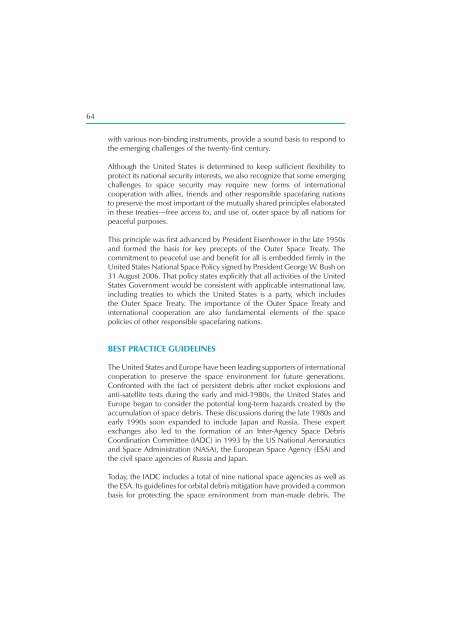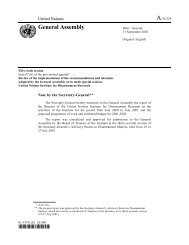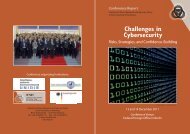Security in Space The Next Generation - UNIDIR
Security in Space The Next Generation - UNIDIR
Security in Space The Next Generation - UNIDIR
You also want an ePaper? Increase the reach of your titles
YUMPU automatically turns print PDFs into web optimized ePapers that Google loves.
64<br />
with various non-b<strong>in</strong>d<strong>in</strong>g <strong>in</strong>struments, provide a sound basis to respond to<br />
the emerg<strong>in</strong>g challenges of the twenty-fi rst century.<br />
Although the United States is determ<strong>in</strong>ed to keep suffi cient fl exibility to<br />
protect its national security <strong>in</strong>terests, we also recognize that some emerg<strong>in</strong>g<br />
challenges to space security may require new forms of <strong>in</strong>ternational<br />
cooperation with allies, friends and other responsible spacefar<strong>in</strong>g nations<br />
to preserve the most important of the mutually shared pr<strong>in</strong>ciples elaborated<br />
<strong>in</strong> these treaties—free access to, and use of, outer space by all nations for<br />
peaceful purposes.<br />
This pr<strong>in</strong>ciple was fi rst advanced by President Eisenhower <strong>in</strong> the late 1950s<br />
and formed the basis for key precepts of the Outer <strong>Space</strong> Treaty. <strong>The</strong><br />
commitment to peaceful use and benefi t for all is embedded fi rmly <strong>in</strong> the<br />
United States National <strong>Space</strong> Policy signed by President George W. Bush on<br />
31 August 2006. That policy states explicitly that all activities of the United<br />
States Government would be consistent with applicable <strong>in</strong>ternational law,<br />
<strong>in</strong>clud<strong>in</strong>g treaties to which the United States is a party, which <strong>in</strong>cludes<br />
the Outer <strong>Space</strong> Treaty. <strong>The</strong> importance of the Outer <strong>Space</strong> Treaty and<br />
<strong>in</strong>ternational cooperation are also fundamental elements of the space<br />
policies of other responsible spacefar<strong>in</strong>g nations.<br />
BEST PRACTICE GUIDELINES<br />
<strong>The</strong> United States and Europe have been lead<strong>in</strong>g supporters of <strong>in</strong>ternational<br />
cooperation to preserve the space environment for future generations.<br />
Confronted with the fact of persistent debris after rocket explosions and<br />
anti-satellite tests dur<strong>in</strong>g the early and mid-1980s, the United States and<br />
Europe began to consider the potential long-term hazards created by the<br />
accumulation of space debris. <strong>The</strong>se discussions dur<strong>in</strong>g the late 1980s and<br />
early 1990s soon expanded to <strong>in</strong>clude Japan and Russia. <strong>The</strong>se expert<br />
exchanges also led to the formation of an Inter-Agency <strong>Space</strong> Debris<br />
Coord<strong>in</strong>ation Committee (IADC) <strong>in</strong> 1993 by the US National Aeronautics<br />
and <strong>Space</strong> Adm<strong>in</strong>istration (NASA), the European <strong>Space</strong> Agency (ESA) and<br />
the civil space agencies of Russia and Japan.<br />
Today, the IADC <strong>in</strong>cludes a total of n<strong>in</strong>e national space agencies as well as<br />
the ESA. Its guidel<strong>in</strong>es for orbital debris mitigation have provided a common<br />
basis for protect<strong>in</strong>g the space environment from man-made debris. <strong>The</strong>








